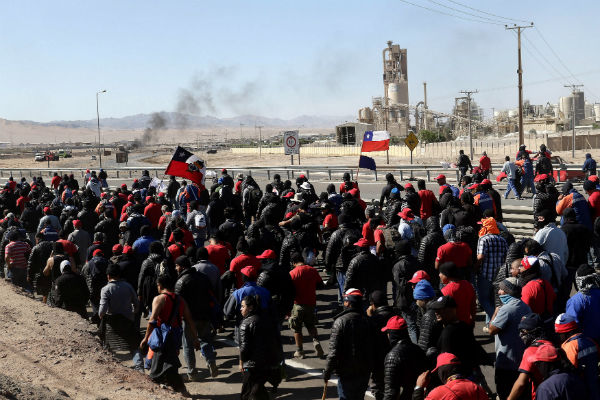Fight over benefits for new workers, benefits changes, shift adjustments

SANTIAGO (Reuters) — A three-week-long strike at Chile's Escondida, the world's biggest copper mine, turned ugly on Wednesday when a group of striking workers blocked a highway, provoking confrontations with the police.
Escondida's approximately 2,500 unionized workers began a strike on Feb. 9 after contract talks with mine owner BHP Billiton failed, boosting global copper prices on expectations of tighter supply.
Early Wednesday morning, around 800 workers carried out a protest on the main road that connects the regional city of Antofagasta with the mine, the union said.
A Reuters witness said the protesters blockaded the road, burned tires and threw rocks and sticks at the police, who responded with tear gas. By late morning, the protesters had dispersed.
The union said a "strong police contingent" acted against the protesters and left three workers injured, adding that union leaders had calmed the situation.
Escondida criticized the violence and said: "We reiterate the need to keep this process within the bounds of legality."
The events reflect the increasing bitterness and division between the two sides, as the pressure to secure a deal on both ratchets up, but whose positions still appear to be far apart after three weeks of strike.
Key differences include disagreement over the level of benefits new workers should receive, and planned changes to shift patterns and benefits.
The union complained earlier this week that BHP had failed to make back payments to workers, while the company said that it would make the payments once the strike had ended, in accordance with Chilean law.
A local judge ruled on Tuesday that a deferred payment from 2016 should go out to workers, and BHP said on Wednesday that it disagreed with the ruling but would comply.
The union is keen to prevent workers from losing enthusiasm as the strike drags on, especially as after 30 days, individual miners have the right to break from the union agreement and accept the company offer.
The company has waived the right to replace workers before 30 days, sacrificing output in an attempt to ease tensions and potentially weaken the union position.
A government-led attempt at mediation failed last week. Although both sides say they are open to talks, there has been little concrete sign of a resumption of dialog in the near future.
Escondida, which produced around 5 per cent of global copper output last year, is majority-controlled by BHP. Rio Tinto and Japanese companies including Mitsubishi Corp hold minority interests.




